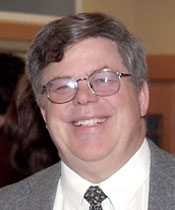Thursdays, 4:30–5:30 pm
6 January–10 March 2011
School of Aquatic & Fishery Sciences
102 Fishery Sciences (auditorium)
1122 NE Boat Street (map)
University of Washington
Reception follows each talk
For more information, contact:
Trevor Branch, 206-221-0776
tbranch@u.washington.edu
courses.washington.edu/susfish
Funding for the Series is generously
provided by Tanya Bevan, friends of Don
Bevan, the UW School of Aquatic and
Fishery Sciences, and NOAA's Alaska
Fisheries Science Center and
Northwest Fisheries Science Center.
Ocean Acidification: Effects on Fisheries and Oceans
6 Jan

Richard Feely
Senior Scientist, NOAA Pacific Marine Environmental Laboratory, Affiliate Professor in the School of Oceanography
Ocean Acidification: Global Warming's Evil Twin
Abstract
Carbon dioxide (CO2) is one of the most important “greenhouse” gases in the atmosphere affecting the radiative heat balance of the earth. As a direct result of the industrial and agricultural activities of humans over the past two centuries, atmospheric CO2 concentrations have increased by about 100 ppm. The atmospheric concentration of CO2 is now higher than experienced on Earth for at least the last 800,000 years, and is expected to continue to rise, leading to significant temperature increases in the atmosphere and oceans by the end of this century. The global oceans are the largest natural long-term reservoir for this excess heat and CO2, absorbing approximately 85% of the heat and 30% of the anthropogenic carbon released into the atmosphere since the beginning of the industrial era. Recent studies have demonstrated that both the temperature increases and the increased concentrations of CO2 in the oceans are causing significant changes in marine ecosystems. Many marine organisms are already affected by these anthropogenic stresses, including impacts due to coral bleaching and ocean acidification. Dr. Feely will discuss the present and future implications of increased temperature and CO2 levels on the health of our ocean ecosystems and related ocean-based economies.
Bio
Richard A. Feely is a Senior Scientist at the NOAA Pacific Marine Environmental Laboratory in Seattle. He also holds an affiliate full professor faculty position at the University of Washington School of Oceanography. His major research areas are carbon cycling in the oceans and ocean acidification processes. He received a B.A. in chemistry from the University of St. Thomas, in St Paul, Minnesota in 1969. He then went on to Texas A&M University where he received both a M.S. degree in 1971 and a Ph.D. degree in 1974. Both of his post-graduate degrees were in chemical oceanography. He is the co-chair of the U.S. CLIVAR/CO2 Repeat Hydrography Program. He is also a member of the Steering Committee for the U.S. Carbon and Biochemistry Program. He is a member of the American Geophysical Union, the American Association for the Advancement of Science and the Oceanography Society. Dr. Feely has authored more than 200 refereed research publications. He was awarded the Department of Commerce Gold Award in 2006 for research on ocean acidification. In 2007, Dr. Feely was elected to be a Fellow of the American Geophysical Union. In November he was awarded the Heinz Award for his pioneering research on ocean acidification.
Video
Readings
- Doney, S. C., V. J. Fabry, R. A. Feely, and J. A. Kleypas. 2009. Ocean Acidification: The Other CO2 Problem. Annual Revue of Marine Science 1: 169–92.
- Feely, R. A., C. L. Sabine, J. M. Hernandez-Ayon, D. Ianson, B. Hales. 2008. Evidence for Upwelling of Corrosive "Acidified” Water onto the Continental Shelf. Science320: 1490-1492.
- Doney, S. C., W. M. Balch, V. J. Fabry, R. A. Feely. Ocean Acidification: A Critical Emerging Problem for the Ocean Sciences. 2009. Oceanography 22 (4): 18-27.